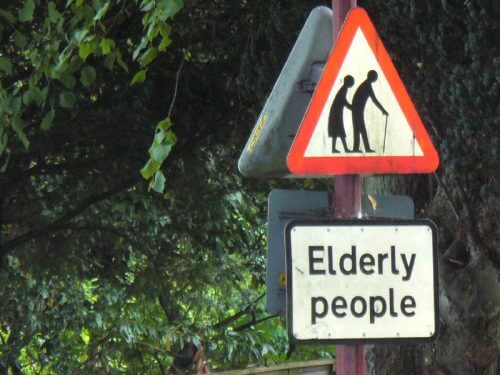The average life expectancy in Israel has increased by ten years since the XNUMXs. But quantity does not necessarily indicate quality: studies show that exposure to air pollution accelerates aging and causes chronic diseases

By Maya Falah, Angle, Science and Environment News Agency
When the oldest woman in the world was asked until recently - Susanna Moshet Jones, who was born in 1899 and passed away in May of last year and is 116 years old - what her secret to longevity was, she answered simply: "Sleep". Jones not only made sure to sleep about ten hours every night and take another nap here and there during the day, but also made sure to eat a rich breakfast every morning containing bacon, scrambled eggs and potatoes. Not really what we would define today as a healthy meal.
Although Jones is considered an exception in terms of the extreme age she reached, it is evident that the population in the Western world is getting older as time goes by: According to World Bank data, the average life expectancy in Israel as of 2014 was 82.1 years, compared to 1961, when it was a decade lower. Naturally, this means that the percentage of the elderly in the population is increasing. in Israel, in 2014, The number of elderly people in the population stood (people whose age exceeds 65) about 900 thousand, which is about 11 percent of the entire population. According to the CBS data, their number is expected to grow to 2035 million in 1.66 - which is almost 15 percent of the total population.
Everyone wants to believe and hope that they will not only live long, but also manage to grow old with dignity; But although modern medicine helps to prolong life, old age is often accompanied by various diseases such as heart disease, dementia, high blood pressure and diabetes. In recent years, an understanding has been taking shape that many of these diseases, and our tendency to develop them (especially in older people), are probably influenced quite a bit by the environment in which we live: an environment that is currently abounding in pesticides, soil and water contamination, and air pollution.
Exposure to air pollution - two years of aging
Air pollution is not the only cause For the death of more than 2,000 people in Israel alone each year, but it also causes a host of health problems among the population such as heart disease, respiratory disease and cancer. And if that's not enough, studies indicate that it probably increases the risk of autism in fetuses and babies And so is the risk for mental disorders in children and youth. In light of all this, it is perhaps not surprising to hear that in recent years' research in the field of public health, more and more evidence is accumulating that air pollution also plays a significant role in determining the rate and manner of aging of the population.
study conducted by Chinese and German researchers found that chronic exposure to air pollution has an effect on skin aging: the researchers found that exposure to nitrogen dioxide (NO2) - a gas that comes mainly from transport emissions - causes the appearance of age spots on the skin, especially on the face. Further research, which was conducted on a population of nearly 20,000 women in the United States aged 70-81, found that the cognitive abilities of women who lived in areas where particulate air pollution (PM) was high deteriorated faster than the average for the general population. In the study, it was found that the women in these areas performed on average according to the results corresponding to women two years older than them - that is, according to these findings, it can be said that exposure to chronic air pollution is equivalent to two years of accelerated aging in terms of cognitive ability.
Another study who also examined the effect of particulate air pollution, this time dealing with its effect on people who reach an extreme age (that is, pass the age of 85). In this large-scale study, a population of approximately 28 million people across the United States was examined. The researchers analyzed data on this population from the 2010s to 2010, to check how many of them reached the ages of 85-94 and 100-104 as of XNUMX, and whether their exposure to air pollution had an effect on that. The research data showed overwhelmingly that in the population exposed to high air pollution, fewer people of both age groups survived to extreme old age.
Fragile people are more vulnerable

In a new article published recently Doctoral student Gali Cohen and Prof. Yariv Gerber from the School of Public Health at Tel Aviv University examine the relationship between air pollution and aging. In their research, they examined not only whether air pollution causes a shortening of life expectancy, but also how the population living in an environment where air pollution is high ages - is it, for example, more likely to suffer from various diseases in old age?
"In the article we focused on 'successful aging,'" says Cohen, "which is a term that refers to how one ages, and not just what age one reaches. The question we asked is whether there is a connection between chronic exposure to air pollution and successful aging, or rather - unsuccessful aging. There is a lot of evidence in the literature today that prolonged exposure to air pollution causes chronic illness, and since this is the case we asked ourselves if it is possible that air pollution is also related to the issue of successful aging.
"Of course, the obvious question in this context is how do you define 'successful aging'?" Cohen continues. "We checked in the literature what the definition is, and we discovered that it is a very flexible definition - it was difficult to find a specific index that defines it. Most studies talk about successful aging in the context of avoiding chronic illness and the limitations associated with it, of preserving cognitive ability, of longevity, and various other indicators; But all of these are not necessarily quantitative indicators, so it is relatively difficult to test them and associate them with successful or unsuccessful aging.'
The index that the researchers finally chose as the most appropriate to define what successful aging is is the frailty index. "The frailty syndrome in medicine is used as a quantitative index, which reflects the degree of conservation of reserves in the various body systems," explains Cohen, "and takes into account variables such as chronic diseases, limitations in daily functioning, weight loss, and more." It is basically a defined scale that the higher the score, the more fragile the person is, and it is found to be a predictor of mortality in old age.
"Among the studies we reviewed, we found a connection between the two elements - chronic exposure to air pollution and the presence of the fragility syndrome," she adds, "and not only did we find a connection between them, but studies also found that 'fragile' people are more vulnerable to the various effects attributed to air pollution: study done in the United States, for example, found that a decrease in the capacity of the respiratory system associated with air pollution is more common among people whose frailty index is high. study other Prof. Gerber's also showed that the mortality of fragile people who are exposed to air pollution is higher.'
It's not the amount
In order to live not only long lives but also a good quality of life, it is important to find solutions to reduce air pollution: for example, reducing the use of private transportation and switching to public transportation, reducing the use of fossil fuels and switching to the use of renewable energies.
Even switching to electric vehicles at the expense of internal combustion engines can dramatically reduce the amount of respirable particles and oxides emitted today on the streets of cities "at the height of the nose", and turn those emissions into points at a height of hundreds of meters in the chimneys of power plants. Even in the use of fossil fuels, there is a preference for gas over diesel, fuel oil and coal, which emit more carbon dioxide and more particles - and this is only as a stop on the way to renewable energies.

5 תגובות
Let them run in nature and eat healthy and sleep well
Lots of health
In addition - to everyone who smokes and to everyone who eats industrial food - the air pollution for him is zero in sixty, so this article is not relevant for him.
Note to the correction: "The researchers found that exposure to nitrogen dioxide (NO2) - a gas that originates mainly from emissions from transportation...".
This is of course nitrogen dioxide.
The article itself is interesting.
There are things beyond man's control like environmental pollution. But there are things that can be controlled, such as not smoking, not drinking alcohol, eating healthy, maintaining a healthy weight, playing sports and exercising the brain even in old age.
It's a shame that the article doesn't talk about all the chemicals and unhealthy ingredients like sugar, salt and unhealthy fat that are put in our food and how harmful they are to our health, in my opinion, much more than air pollution.
I am responding here to the advertisement that is shown below to the article ↑ of produce chicken….. █
All kosher food will contain salt, even a significant reduction will leave it salty. (You can wash or soak.) The solution is to eat meat that has not been qualified (for those who are not religious.) The problem remains severe in workplaces and similar public kitchens, such as schools and others. About 30% of adults find that salt harms their health in a significant way and they should avoid it█. As a rule, industrial food should be avoided as much as possible. You can spend another half hour a day and avoid industrial food. (This is also how you enjoy tastier food that suits the personal needs of everyone's taste.) With an appetite.